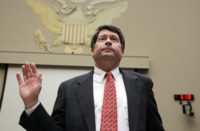Trial to Begin This Week for Peanut Corp. of America Officials

Source (of the text below and the 2009 file photo [at left] of Peanut Corporation of America's president, Stewart Parnell): Associated Press via Yahoo News
Three people accused of scheming to manufacture and ship Salmonella-tainted peanuts that killed nine people, sickened more than 700 and prompted one of the largest food recalls in history are set to go to trial this week in south Georgia.
A federal indictment unsealed in February 2013 brought charges against the head of Peanut Corporation of America and several others stemming from the outbreak tied to peanuts processed by the company. It was an unusual move by the federal government, which rarely prosecutes companies in food poisoning cases.
Federal investigators found filthy conditions at the company's Georgia plant and said the employees even fabricated certificates saying peanut product shipments were safe when tests said otherwise.
Company owner Stewart Parnell invoked the Fifth Amendment to avoid testifying before a congressional committee in February 2009. Emails obtained by congressional investigators showed that he once directed employees to "turn them loose" after samples of peanuts tested positive for Salmonella and then were cleared in another test.
Several months before the outbreak, when a final lab test found Salmonella, Parnell expressed concern to Georgia plant manager Samuel Lightsey, writing in an Oct. 6, 2008, email that the delay "is costing us huge $$$$$."
The Centers for Disease Control and Prevention found 714 people in 46 states were infected between September 2008 and March 2009. There were three deaths in Minnesota, two in Ohio, two in Virginia, one in Idaho and one in North Carolina.
The 76-count indictment charged Parnell and his food broker brother Michael Parnell with conspiracy, mail fraud, wire fraud and the introduction of adulterated and misbranded food into interstate commerce with the intent to defraud or mislead. Stewart Parnell and Georgia plant quality assurance manager Mary Wilkerson were also charged with obstruction of justice.
The conspiracy and obstruction charges each carry a maximum sentence of 20 years in prison.
Lightsey pleaded guilty in May to seven counts. He will be sentenced at a later date.
Food and Drug Administration inspectors found bad conditions in the company's plant in Blakely, GA, including mold, roaches and a leaky roof. Another plant in Plainview, Texas, was shuttered by that state's Department of Health Services in February 2009 after product samples tested positive for Salmonella.
Jeff Almer's 72-year-old mother, Shirley, was among the nine people who died after eating tainted peanut butter. After successfully battling lung cancer and a brain tumor, she ate the bad peanut butter while being treated for dehydration in a Minnesota hospital.
Since his mother's death in December 2008, Almer has researched foodborne illnesses and pushed for stricter legislation on safeguards. He's also been one of the leading voices calling for prosecution against Peanut Corp. and said he plans to travel from the Twin Cities area to attend parts of the trial.
"I didn't know whether to celebrate or mourn," he said, recalling the moment he heard about the indictment. "It was a really tough situation because it reminded me about my mom's situation all over again, so the excitement was tempered."
Randy Napier's 80-year-old mother also died after eating contaminated peanut butter at an assisted living home in Ohio. He still harbors anger toward Stewart Parnell and hopes to see him punished.
"That was my mom, and for him to show not remorse, it's really hard," Napier said.
Napier and Almer hope the trial, which is expected to last weeks, sends a message to food manufacturers that there can be serious consequences for peddling contaminated food.
Criminal charges are rare in food outbreak cases because intent is often hard to prove and companies often step up and acknowledge their mistakes.
The indictment said Peanut Corp. misled customers about the existence of Salmonella in its product, even after lab tests showed the bacteria was present. Prosecutors say employees fabricated certificates accompanying some of the peanut shipments saying they were safe.
The company later went bankrupt.
Looking for a reprint of this article?
From high-res PDFs to custom plaques, order your copy today!





